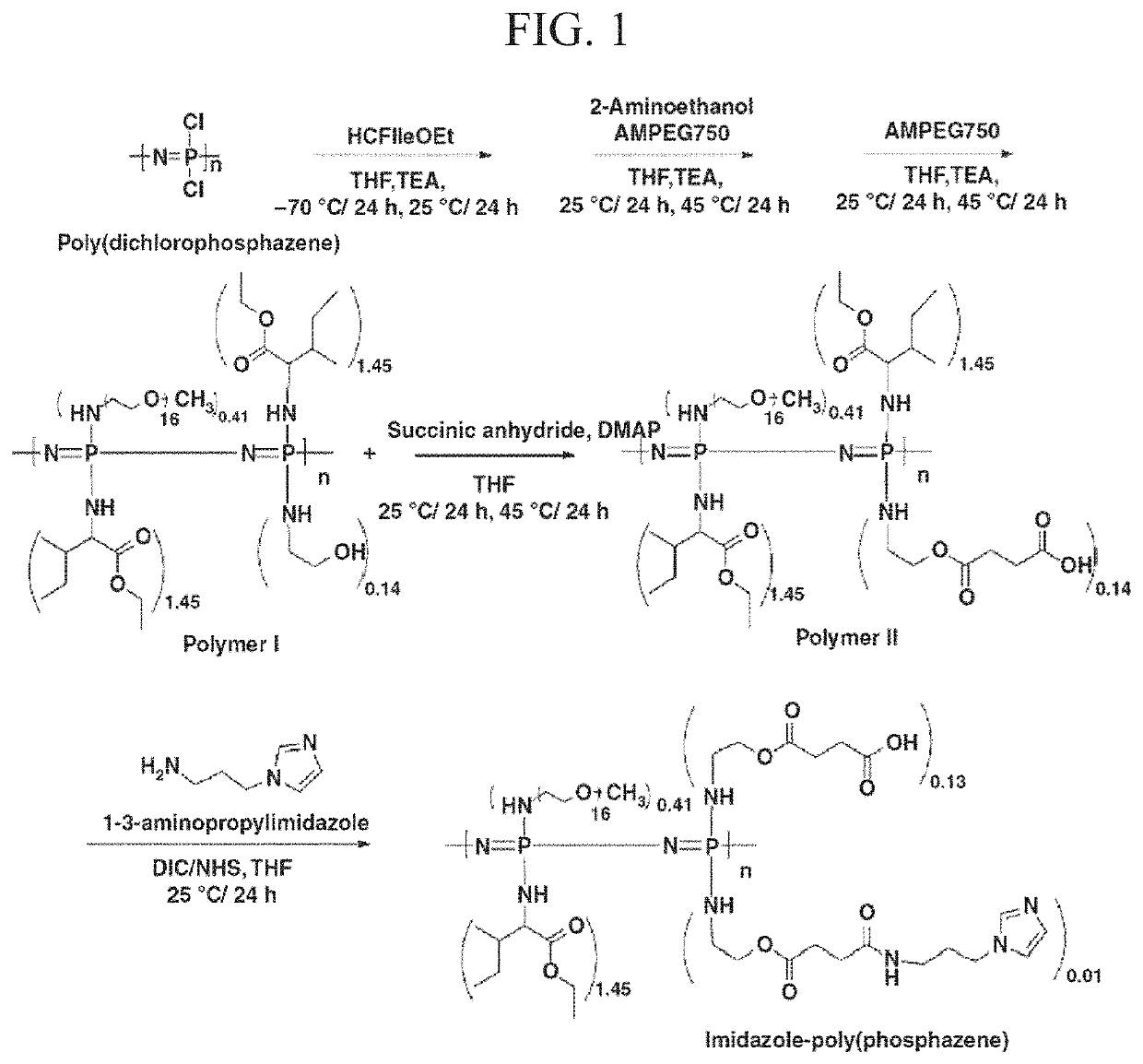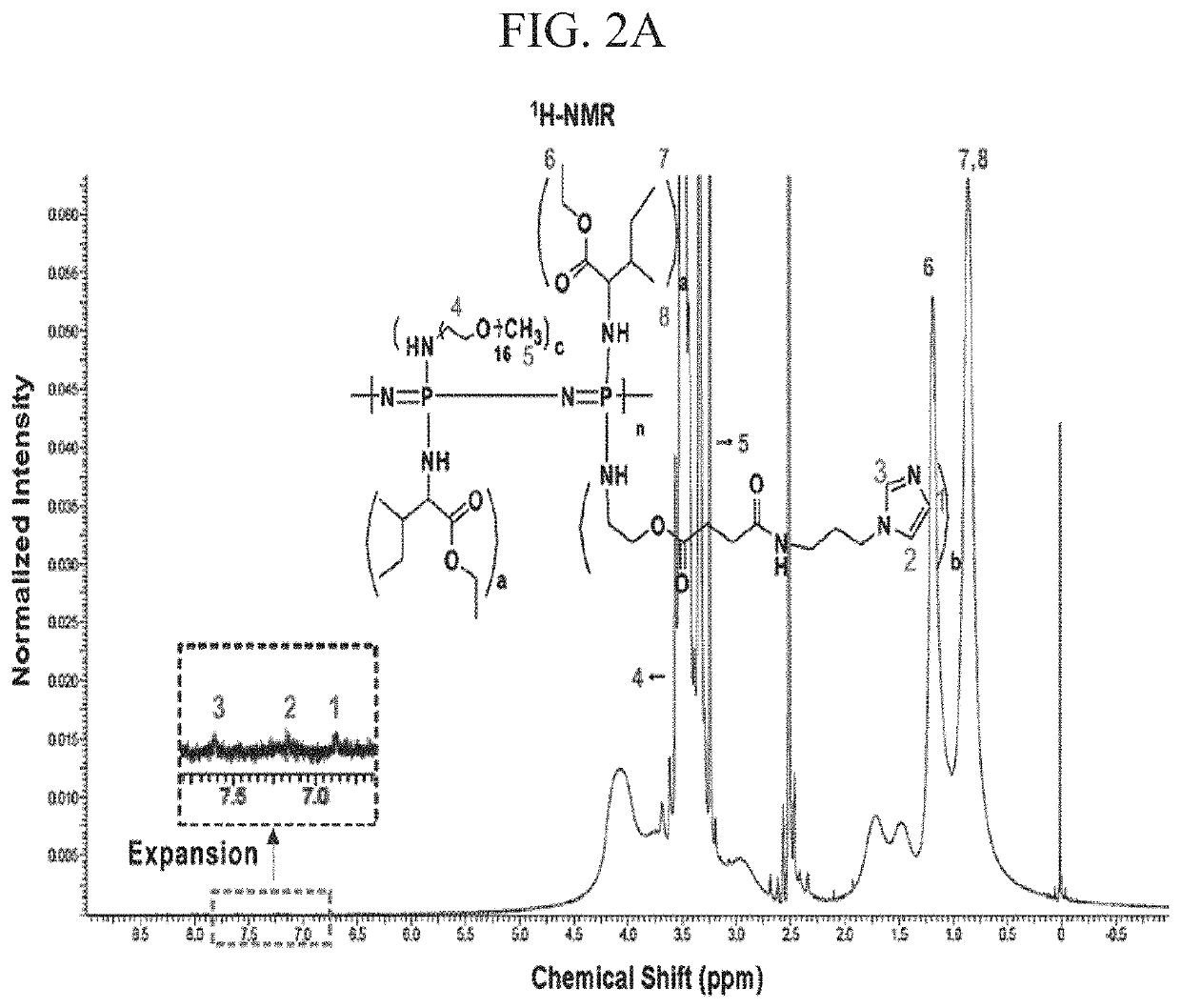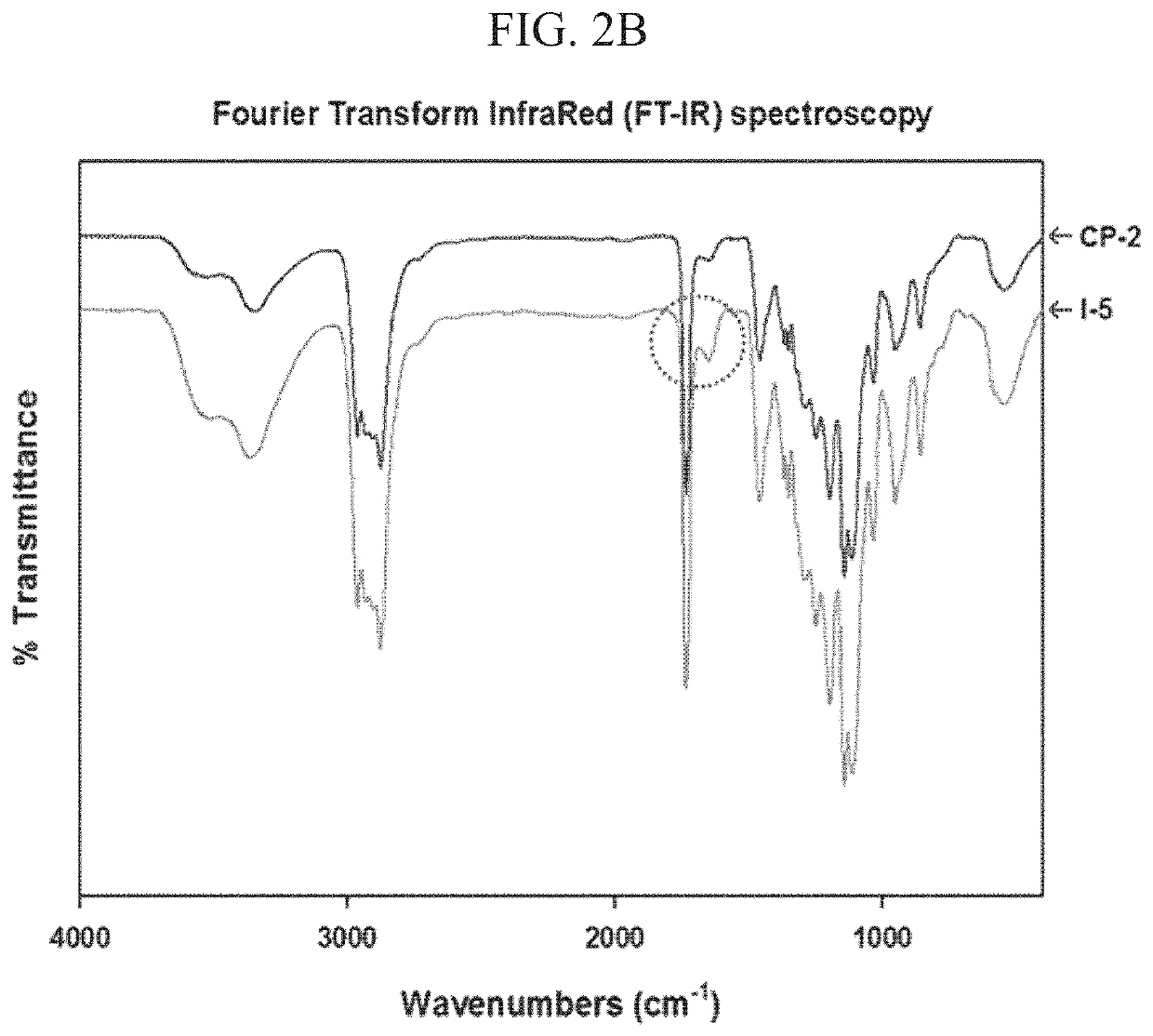Composition for preventing or treating spinal cord injury comprising imidazole-poly(organophosphazene) hydrogel
a technology of imidazole and hydrogel, which is applied in the direction of drug compositions, synthetic polymeric active ingredients, nervous disorders, etc., can solve the problems of affecting the survival and integration of transplanted cells for therapeutic purposes, affecting the survival and integration of transplanted cells, and complicating the injury or vascular damage to the central nervous system (cns). to achieve the effect of effective use for the prevention and treatment of spinal cord injury
- Summary
- Abstract
- Description
- Claims
- Application Information
AI Technical Summary
Benefits of technology
Problems solved by technology
Method used
Image
Examples
preparation example 1
Synthesis of Imidazole-Poly(Organophosphazene) Hydrogel
[0086]All reactions were conducted in a dry nitrogen atmosphere using standard Schlenk-line techniques. The imidazole-poly(organophosphazene) hydrogel of the present disclosure was synthesized according to the process shown in FIG. 1.
Step 1: Synthesis of [NP(IleOEt)1.45(AEtOH)0.14(AMPEG750)0.41]n (Polymer I, EP)
[0087]IleOEt.HCl (23.81 g, 121.67 mmol) in dry tetrahydrofuran (THF) containing triethylamine (TEA) was added slowly to poly(dichlorophosphazene) (10.00 g, 86.29 mmol) dissolved in dry THF. The reaction mixture was incubated in a dry ice bath for 12 hours and at room temperature for 36 hours. AEtOH (1.56 g, 25.50 mmol) and AMPEG750 (37.53 g, 50.04 mmol) were dissolved in dry THF containing TEA and added to the mixture. The reaction mixture was stirred at room temperature for 24 hours and then at 40° C. to 50° C. for 24 hours. AMPEG750 (18.76 g, 25.02 mmol) in the dried THF was added to the reaction mixture and stirred at ...
preparation example 2
Preparation of I-5 Hydrogel Solution
[0096]10 wt % of the I-5 polymer in PBS solution was used for experiments after filtration using a cellulose acetate syringe filter (0.2 μm). In the experiments where the I-5 polymer solution was mixed with Taxol® or siRNA nanoparticles, the I-5 solution (20 wt %) was prepared and used.
Experimental Method 1
Measurement of Physical Properties
[0097]The structures of the polymers prepared in Examples above were estimated by a 1H-NMR spectrometer (Varian Gemini-300, Agilent Technologies) operating at 400 MHz in the Fourier transform mode using CDCl3 as a solvent and by an FT-IR spectrometer (Spectrum GX FT-IR, Perkin-Elmer). The amount of substituted imidazole groups in IP was determined by BCA assay (Pierce). The conjugation of imidazole was confirmed by a high-performance liquid chromatography (HPLC) system (Agilent, 1050 series).
[0098]The molecular weight of the I-5 was calculated using a gel permeation chromatography system (Waters 1515, Waters) in...
experimental results 1
Synthesis and Characterization of I-5
[0125]I-5 was synthesized through conjugation of imidazole to Polymer II (CP-2) by carbodiimide cross-linking between the amine group of 1-(3-aminopropyl)imidazole and the carboxyl group of Polymer II (FIG. 1). The existence of the imidazole group in I-5 was confirmed by the presence of imidazole peaks in the 1H-NMR spectrum and by an increase of the C═O peak, corresponding to the amide bond in Fourier Transform InfraRed (FT-IR) spectroscopy data (FIGS. 2A and 2B). The molecular weight of I-5 ranged from about 14 kDa to 18 kDa.
[0126]Additionally, the results of viscosity measurement of I-5 hydrogel are as follows. As shown in FIG. 3A, the viscosity rose abruptly when the temperature reached 30° C., causing a phase transition from sol to gel state. The viscosity at body temperature was about 600 Pa·s, which indicates that the material injected in vivo has physical strength sufficient to support and maintain the shape of the hydrogel.
[0127]Addition...
PUM
| Property | Measurement | Unit |
|---|---|---|
| temperature | aaaaa | aaaaa |
| temperature | aaaaa | aaaaa |
| Molecular Weight | aaaaa | aaaaa |
Abstract
Description
Claims
Application Information
 Login to View More
Login to View More - R&D
- Intellectual Property
- Life Sciences
- Materials
- Tech Scout
- Unparalleled Data Quality
- Higher Quality Content
- 60% Fewer Hallucinations
Browse by: Latest US Patents, China's latest patents, Technical Efficacy Thesaurus, Application Domain, Technology Topic, Popular Technical Reports.
© 2025 PatSnap. All rights reserved.Legal|Privacy policy|Modern Slavery Act Transparency Statement|Sitemap|About US| Contact US: help@patsnap.com



